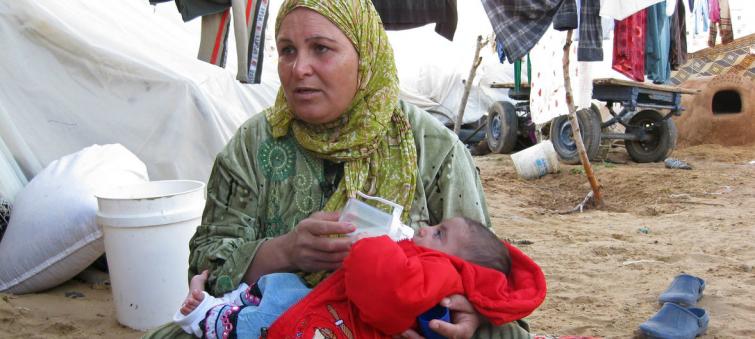
‘Complete political deadlock’ over Middle East peace risks more violence, regional escalation, warns UN envoy
New York, Aug 28 (IBNS): Tangible steps “can, and must, be taken” to urgently reverse the “negative trajectory” of the Palestinian-Israeli conflict and revive the peace process, a senior United Nations envoy told the Security Council on Tuesday.
“Against the backdrop of the complete political deadlock of the Middle East peace process and the lack of any perspective to revive it,” Nickolay Mladenov, Special Coordinator for the Middle East Peace Process, said that “the rising specter of violence in the West Bank and Gaza” threatens a regional escalation.
Warning again of repercussions over the lack of a political horizon towards resolving the Israeli-Palestinian conflict on the basis of the two-state solution, he said that unilateral moves on the ground, terror attacks and a multitude of other factors risk are creating “an explosive mix” that can only be resolved through strong leadership returning to the table for “meaningful negotiations towards a sustainable and just peace”.
Mladenov, who briefed the Council via videconference from Jerusalem, elaborated on the need for “a leadership that can stand up to extremists and radicals and uphold what the international community, the Security Council and the region have said so many times – that lasting peace can only be based on the idea that Israelis and Palestinians live side-by-side in peace, security and mutual recognition, as both peoples have a legitimate and historic right to their own statehood”.
Straying from a framework based on UN resolutions and mutual agreements will lead to “inevitable radicalization”, stressed Mladenov.
Giving up on the goal of a peaceful resolution to the conflict would lead to an alternative “too horrible to fathom.”
A sobering recap
In the past month, there has been an increase of violent incidents, including settler-related offenses in the West Bank and continuing tensions in and around Gaza, including in Jerusalem’s Old City, a settlement south of Bethlehem and one northwest of Ramallah, the Special Coordinated flagged.
“I unequivocally condemn all attacks on Palestinian and Israeli civilians”, he asserted, calling the attacks “cowardly and dangerous” and saying that they “serve only those who want escalation”.
“Violence and terrorism must be condemned by all,” he stated.
He also spoke of Israel’s policy of destroying Palestinian property, which is incompatible “with its obligations under international humanitarian law.”
He said the expansion of settlements not only “has no legal effect and constitutes a flagrant violation of international law” but “by advancing the effective annexation of the West Bank, it undermines the chances for establishing a Palestinian state”.
Gaza tensions
Despite the relative calm over the past two months, Gaza remains “very fragile as violent incidents continue”, the UN envoy indicated.
He updated the Council that during the reporting period, among other things, “some eleven rockets and mortars were launched from Gaza towards Israel”, two of which caused material damage. And in retaliation, Israel temporarily reduced a fuel transfer to Gaza by half, reducing the Strips’ energy supply.
Meanwhile, weekly protests at the perimeter fence continued with some violent activities. Although fewer incendiary kites, balloons and other devices were launched from Gaza compared to the last reporting period, at least eleven fires were reported.
“Israel must calibrate its use of force and use lethal force only as a last resort, and only in response to imminent threats of death or serious injury”, said Mladenov. “Hamas must prevent the indiscriminate launching of rockets and mortars towards Israel”, and ensure that “protests at the fence remain peaceful and prevent provocations”.
Raising the alarm on health
A lack of medical resources has prompted the UN envoy to also “raise the alarm on the deteriorating situation in the health sector in Gaza”.
According to the World Health Organization (WHO), in July, 49 per cent of essential medications and 26 per cent of medical disposables were reported to be at less than one-month supply at Gaza’s Central Drug Store.
And during Deputy Special Coordinator Jamie McGoldrick’s visit to a Gaza hospital over the winter, he had heard about the large number of health issues that Palestinian women are facing as a result of the humanitarian crisis.
“Doctors highlighted the scarcity of cancer drugs in Gaza and the unpredictable referral system for treatment outside Gaza as serious challenges” detailed Mladenov, adding that the UN is committed “to working with all parties, including donors, to prevent a health crisis in the Gaza Strip”.
Over the past month Israel continued to impose movement and access constraints on UN national staff and international non-governmental organizations (NGOs) in Gaza rendering them unable to leave the Strip.
“Israel must significantly improve the movement and access of goods and people to and from Gaza as a step towards the lifting of the closures, in line with Security Council resolution 1860 (2009)”, he stated.
Photo caption and credit:
World Bank/Natalia Cieslik
A Displaced woman feeds a child in Gaza. (File)
Support Our Journalism
We cannot do without you.. your contribution supports unbiased journalism
IBNS is not driven by any ism- not wokeism, not racism, not skewed secularism, not hyper right-wing or left liberal ideals, nor by any hardline religious beliefs or hyper nationalism. We want to serve you good old objective news, as they are. We do not judge or preach. We let people decide for themselves. We only try to present factual and well-sourced news.







